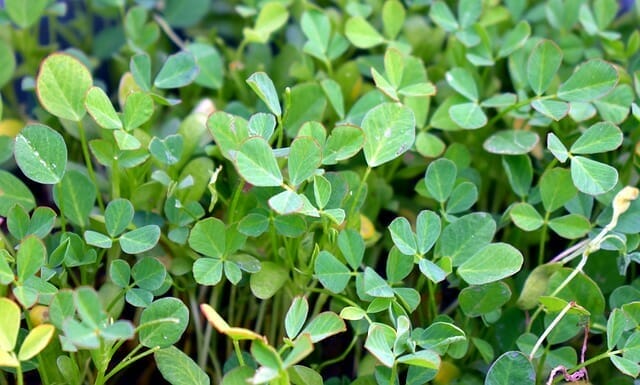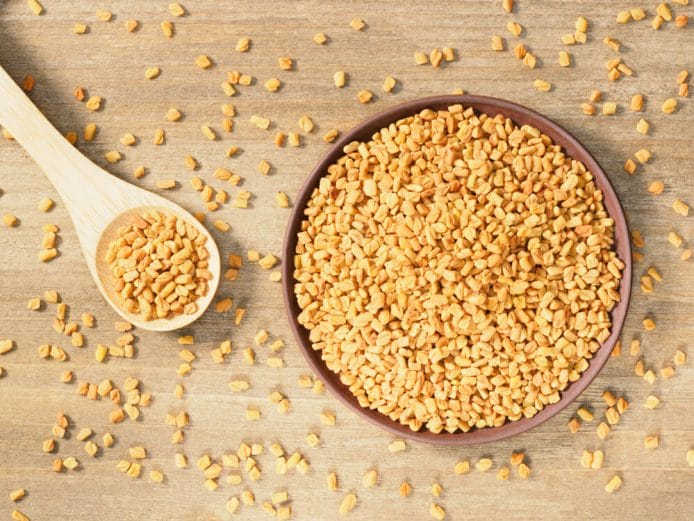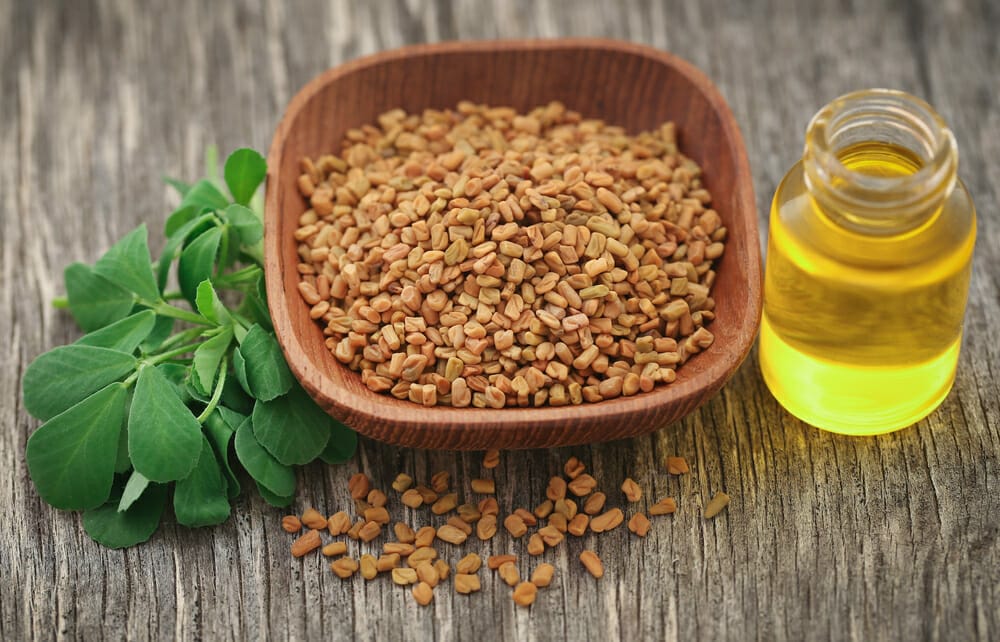Fenugreek is a valued spice, which is included in the curry mix and works perfectly in all dishes with an oriental flavor. However, it is also worth appreciating its health-promoting properties, which include positive influence on digestive processes, ability to lower bad cholesterol and blood sugar levels, as well as strong anti-inflammatory activity. Its main active ingredient responsible for many beneficial actions are steroidal saponins, but this plant is also rich in many other valuable substances. The long list of benefits of fenugreek seeds includes nourishing, strengthening and repairing properties for the hair and skin. If one is struggling with alopecia, seasonal hair loss, damaged hair or slow hair growth or various skin imperfections, a fenugreek seed treatment can be of great assistance.
Table of contents
What is fenugreek seed?
Fenugreek or fenugreek seed (Trigonella foenum-graecum L.) is a plant of the Fabaceae family which is highly esteemed in the culinary and natural medicine world. Its original habitat is Asia (e.g. Caucasus and Uzbekistan) and Eastern Europe (Estonia, Moldova, Ukraine and Lithuania). Today it is spread all over the world. Since ancient times, it has also played an important role in traditional Asian medicine.

The fenugreek plant resembles clover in appearance. It has small, three-lobed leaves, an upright, slightly erect stem, small yellow flowers and fruits in the form of curved pods. It grows up to 50-60 cm. Fenugreek seeds are herbal and spice seeds – small irregularly shaped beige seeds .
Fenugreek emits a very specific, somewhat faint, not very pleasant for our sense of smell. It is a strongly melliferous plant and very popular with insects. The fenugreek seeds contain a rich arsenal of valuable substances, thanks to which they are a highly exploited raw material both in phytotherapy, as well as in natural cosmetics. As far as the culinary arts are concerned, fenugreek seeds occupy a particularly important place in Indian and Arabic cuisine, but they are also often used in other Asian cuisines. They are also becoming increasingly popular in European cuisines.
Fenugreek seed – composition
Fenugreek is a plant with versatile health-promoting properties. For centuries, it has been used in folk medicine, among other things, as a remedy for boils, abscesses, eczema, as well as for coughs, tuberculosis, anemia and digestive problems. In ancient times, fenugreek seed oil was used for body care.
Due to the appearance of the plant’s leaves or fruits, fenugreek has been given many common names such as Greek hay, Greek clover, fenegreek, philosophers’ clover, miracle deer herb, divine grass, and goat grass.
The composition of fenugreek seeds is a wealth of valuable compounds for the human body, including vitamins, minerals, amino acids, alkaloids, sterols. Many active substances present in fenugreek seeds act as antioxidants, neutralizing harmful reactive oxygen species and protecting our cells from damage.
What do fenugreek seeds contain?
- Protein compounds,
- amino acids (including 4-hydroxyisoleucine),
- mucilages (mainly galactomannan),
- bitters,
- dietary fibers (mainly glukomannan),
- essential oils,
- vitamin C,
- vitamin A,
- B vitamins (riboflavin, thiamine, folic acid, B6, vitamin PP or isonicotinic acid amide),
- steroid saponins,
- fatty compounds,
- choline,
- phospholipids (including lecithin),
- minerals (among others, phosphorus, sulphur, calcium, magnesium, selenium, zinc, iron),
- coumarins,
- alkaloids (mainly trigonelline),
- flavonoids (e.g. vitexin, isovitexin, quercetin and vicenin).
Medicinal properties of fenugreek
Due to its wide composition, the curative properties of fenugreek are very diverse and concernThe fenugreek plant has a wide variety of medicinal qualities and affects the majority of organs in the body, including the liver, stomach, large intestine, brain and pancreas. Interestingly, the plant also has excellent properties for the regeneration of damaged tissues.
Fenugreek also has a beneficial effect on our hormonal balance. Moreover, it is classified as an adaptogen, which means that it accelerates the adaptation of the body to the existing conditions, reduces the susceptibility to physical and mental stress, improves the functioning of all body systems and restores the balance in the system.
Fenugreek for good digestion
Thanks to its bitter substances, mucilage and dietary fibres, fenugreek has a beneficial effect on the digestive system. It displays anti-inflammatory and antiparasitic properties (it inhibits the multiplication of parasites of the digestive system and facilitates fighting infections). It protects the mucous membranes of the gastrointestinal tract, preventing stomach ulcers and preventing pain, for example, after eating spicy food.
It stimulates the secretion of gastric and pancreatic juice, bile and saliva, improving food digestion and preventing indigestion, reflux, heartburn, feeling of heaviness in the abdominal cavity.
Fenugreek has a positive influence on intestinal peristalsis and simultaneously acts on them in a protective manner. It prevents constipation, flatulence and gas and regulates the bowel movement cycle. Moreover, fenugreek supports liver function, protects its cells and speeds up the regeneration process. It also reduces the risk of colon cancer.
Fenugreek for a healthy circulatory system
The steroidal saponins present in fenugreek seeds play an important role in our health, including the health of the circulatory system. They improve fat metabolism, prevent excessive fat absorption from food and, at the same time, lead to a reduction in bad cholesterol levels in the blood. Thanks to these actions, they improve the condition of blood vessels, prevent the accumulation of atherosclerotic plaque in the arteries, decrease the level of cholesterol in the blood.They also have an influence on lowering blood viscosity, reducing the risk of blood clots, atherosclerosis, heart diseases, heart attacks, strokes.
Fenugreek for an effective fight against bacteria and other pathogens
Thanks to numerous vitamins, minerals, sterols, proteins, antioxidants, fenugreek supports the body’s immune system and helps to protect itself against pathogens more effectively. It inhibits the multiplication of pathogenic microorganisms, combats pathogenic bacterial strains as well as viruses, protozoa, fungi and yeasts. Reduces inflammation and alleviates infections caused by them.
High antioxidant potential causes fenugreek to counteract civilization diseases such as: cancer, diabetes, cardiovascular diseases, neurodegenerative diseases. The antioxidants contained in fenugreek neutralise free radicals, an excess of which leads to such illnesses.
Fenugreek for stable blood sugar levels
Coumarin, trigonelline, 4-hydroxyisoleucine, galactomannan and glukomannan are the main substances with which fenugreek exerts a beneficial effect on the sugar balance in the body. It delays the digestion of carbohydrates and inhibits their absorption from food, thus preventing rapid postprandial increases in blood glucose levels. With regular use, it increases the sensitivity of tissues to insulin and makes blood sugar levels more stable.
Fenugreek for muscles
The steroid saponins contained in fenugreek seeds have an anabolic effect, which is good news for people who train and aim to increase muscle volume and model an ideal physique. By stimulating nitric oxide production in the body, they provide increased muscle pumps. They also stimulate muscle protein synthesis and increase muscle endurance and performance.
By regulating the hormone balance, fenugreek seeds increase the levels of bioavailable testosterone (activating the body to increase its production in the event of deficiency). When used systematically during training periods, fenugreek supplements (or fenugreek seed powder) accelerate training effects.
Check: Testosterone Boosters – Ranking
Other properties of fenugreek
- stimulates blood-forming function of the bone marrow, enhances red blood cells production and in this way counteracts anaemia,
- regulates hormone balance, helps to stabilize hormone levels in case of hormone fluctuations (e.g. during menopause and andropause),
- supports fat tissue reduction (by regulating metabolism and normalizing carbohydrate metabolism),
- stimulates lactation,
- it is helpful in diseases of the organ of vision,
- helps in diseases of the respiratory tract (stimulates the production of mucus, has an expectorant effect),
- relieves swelling,
- it is helpful in case of bruises and contusions,
- is a natural remedy for boils and ulcers,
- helps with purulent dermatitis,
- fights rashes, acne and other skin problems,
- accelerates wound healing, promotes skin regeneration,
- improves hair and skin condition,
- helps with libido,
- supports prostate health.
Fenugreek in cosmetics

Ground fenugreek seed is one of those natural products that we can use in a very versatile manner, both for skin care, body care as well as hair care. By combining fenugreek seed powder with other natural ingredients such as vegetable oils, lemon juice, honey, bran, milk etc, In addition, fenugreek powder can also be added to the fenugreek plant as a leave-in moisturiser. Fenugreek can also be added to homemade body scrubs and hair rubs.
Fenugreek on the skin
Fenugreek provides the skin with a rich nutritional boost. It cares for the skin, protects it against adverse effects, tones it, soothes it, helps to maintain the right hydration level and skin tone and improves the skin’s appearance comprehensively.
How fenugreek works on the skin:
- nourishes,
- regenerates,
- protects against dryness and irritation,
- smoothes,
- cleanses, disinfects, fights bacteria and fungi,
- evens out the structure of the skin, eliminates skin changes,
- Firms, revitalizes.
Fenugreek hair
Fenugreek seeds contain a wide range of components which our hair needs for proper growth and development. That is why it is one of the strongest and most beneficial medicinal plants for the condition of our hair. It is worth using fenugreek seeds for a herbal hair treatment in case of excessive hair loss, weakening, fragility and breakage, lack of shine and vitality as well as in case of other hair problems. A fenugreek seed treatment is strengthening, nourishing, enhancing the appearance and protecting the hair all in one.
The fenugreek constituents also contribute to the reconstruction of the hair structure, promote vitaminisation and mineralisation of the hair, regenerate hair cells, inhibit hair loss and have a favourable effect on hair growth.
How can fenugreek hair be used?
In stores and drugstores, fenugreek is available in tablets or capsules at an average price of 20-25 zł per 100 capsules. Also available are multi-ingredient hair care supplements with fenugreek. An appropriately long oral treatment can bring about very good results when it comes to strengthening and rebuilding the hair. Even better results can be achieved by combining the use of fenugreek preparations or drinking fenugreek with direct scalp rubs.
For a packet of ground or unground fenugreek seeds, which will serve us as a base for masks and rubs, we pay only a dozen or so zł. For scalp rubs we can also use ready-made fenugreek oil, which, although is very effective in reducing hair loss, is slightly more expensive than the seeds. For a bottle of 30 ml we pay about 30-35 zł.
Home-made hair loss treatment based on fenugreek seed
A rubbing in with ground fenugreek seeds is an effective method for strengthening the hair roots and follicles and reducing hair loss.
Pour approx. 1 tea spoon of ground fenugreek seed into a cup of boiling water. Allow to cool, strain, pour into a bottle with an atomizer. Spray the liquid on the scalp and rub lightly. It is best to use the rub every 2-3 days or even every day if necessary.
Home-made hair mask with fenugreek (regenerates, strengthens, improves the condition of hair and scalp)
Pour 2 tablespoons of ground fenugreek seeds into a bowl, add about 1 tablespoon of lemon juice and about 1 tablespoon of olive or cosmetic oil (e.g. argan, jojoba or other). Mix until the consistency of mush is obtained. Apply to the hair, wait about 30 minutes, rinse and wash the hair with a mild shampoo.
How to drink fenugreek seed?
Pour a teaspoon of fenugreek seed powder into a mug and pour boiling water over it. Brew under a lid for 10 minutes. Strain. Drink 2 times a day, 100 ml each. You can add a little honey.

